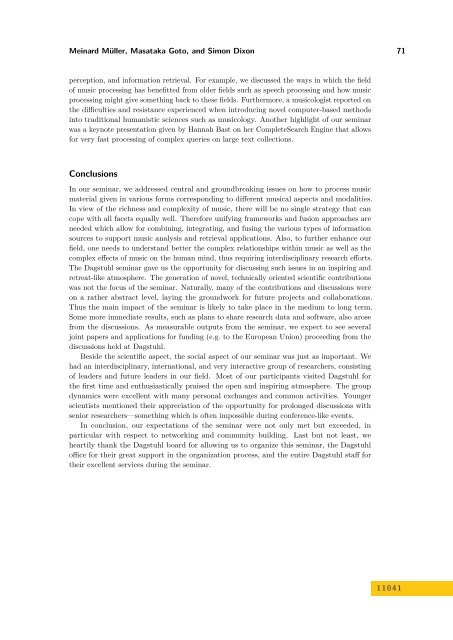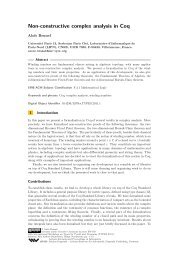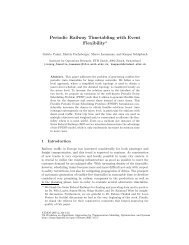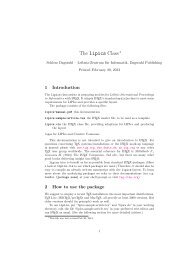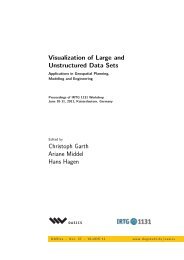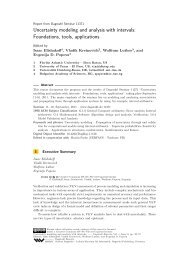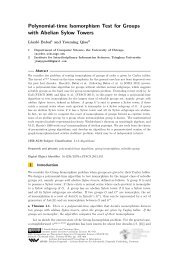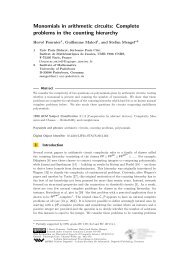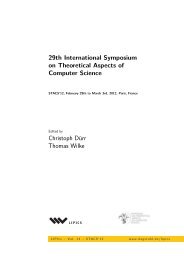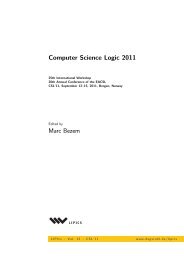Volume 1, Issue 1, January 2011 - DROPS - Schloss Dagstuhl
Volume 1, Issue 1, January 2011 - DROPS - Schloss Dagstuhl
Volume 1, Issue 1, January 2011 - DROPS - Schloss Dagstuhl
You also want an ePaper? Increase the reach of your titles
YUMPU automatically turns print PDFs into web optimized ePapers that Google loves.
Meinard Müller, Masataka Goto, and Simon Dixon 71<br />
perception, and information retrieval. For example, we discussed the ways in which the field<br />
of music processing has benefitted from older fields such as speech processing and how music<br />
processing might give something back to these fields. Furthermore, a musicologist reported on<br />
the difficulties and resistance experienced when introducing novel computer-based methods<br />
into traditional humanistic sciences such as musicology. Another highlight of our seminar<br />
was a keynote presentation given by Hannah Bast on her CompleteSearch Engine that allows<br />
for very fast processing of complex queries on large text collections.<br />
Conclusions<br />
In our seminar, we addressed central and groundbreaking issues on how to process music<br />
material given in various forms corresponding to different musical aspects and modalities.<br />
In view of the richness and complexity of music, there will be no single strategy that can<br />
cope with all facets equally well. Therefore unifying frameworks and fusion approaches are<br />
needed which allow for combining, integrating, and fusing the various types of information<br />
sources to support music analysis and retrieval applications. Also, to further enhance our<br />
field, one needs to understand better the complex relationships within music as well as the<br />
complex effects of music on the human mind, thus requiring interdisciplinary research efforts.<br />
The <strong>Dagstuhl</strong> seminar gave us the opportunity for discussing such issues in an inspiring and<br />
retreat-like atmosphere. The generation of novel, technically oriented scientific contributions<br />
was not the focus of the seminar. Naturally, many of the contributions and discussions were<br />
on a rather abstract level, laying the groundwork for future projects and collaborations.<br />
Thus the main impact of the seminar is likely to take place in the medium to long term.<br />
Some more immediate results, such as plans to share research data and software, also arose<br />
from the discussions. As measurable outputs from the seminar, we expect to see several<br />
joint papers and applications for funding (e.g. to the European Union) proceeding from the<br />
discussions held at <strong>Dagstuhl</strong>.<br />
Beside the scientific aspect, the social aspect of our seminar was just as important. We<br />
had an interdisciplinary, international, and very interactive group of researchers, consisting<br />
of leaders and future leaders in our field. Most of our participants visited <strong>Dagstuhl</strong> for<br />
the first time and enthusiastically praised the open and inspiring atmosphere. The group<br />
dynamics were excellent with many personal exchanges and common activities. Younger<br />
scientists mentioned their appreciation of the opportunity for prolonged discussions with<br />
senior researchers—something which is often impossible during conference-like events.<br />
In conclusion, our expectations of the seminar were not only met but exceeded, in<br />
particular with respect to networking and community building. Last but not least, we<br />
heartily thank the <strong>Dagstuhl</strong> board for allowing us to organize this seminar, the <strong>Dagstuhl</strong><br />
office for their great support in the organization process, and the entire <strong>Dagstuhl</strong> staff for<br />
their excellent services during the seminar.<br />
1 1 0 4 1


